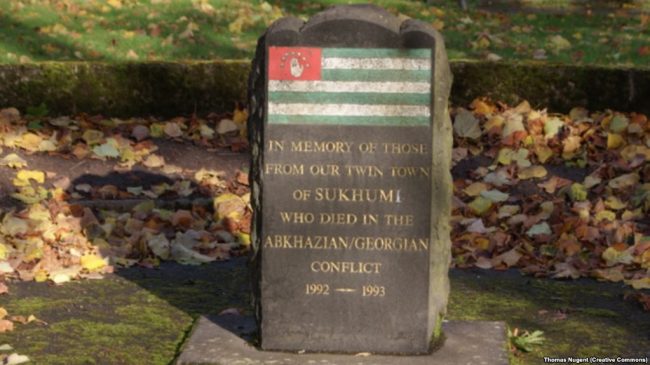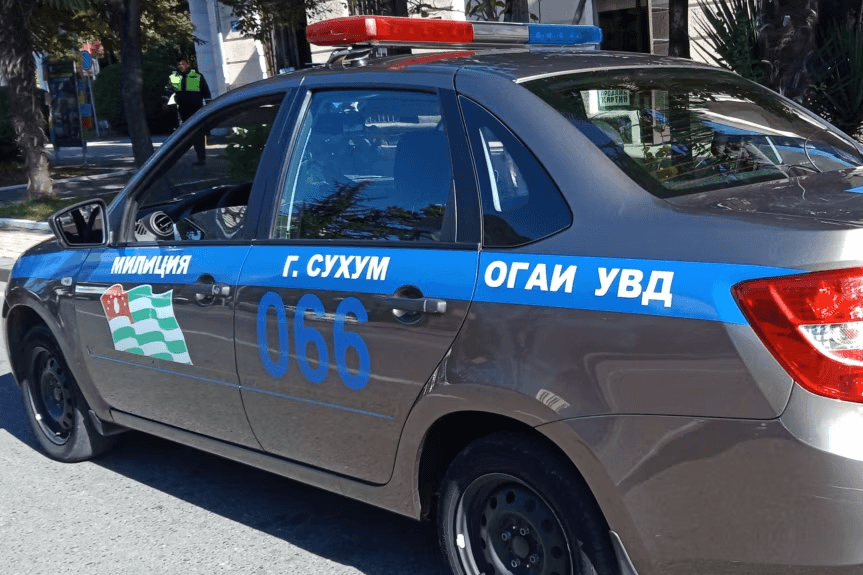

 A recently-removed memorial to victims of the Georgia–Abkhazia war in the Scottish town of Kilmarnock will be reinstalled ‘with revised wording’, Scottish and Georgian officials say. Abkhazian leaders have denounced the move.
A recently-removed memorial to victims of the Georgia–Abkhazia war in the Scottish town of Kilmarnock will be reinstalled ‘with revised wording’, Scottish and Georgian officials say. Abkhazian leaders have denounced the move.
According to East Ayrshire Council, of which Kilmarnock is a part, the memorial’s removal will not be permanent.
Davit Dondua, Deputy Foreign Minister of Georgia, said on 16 November that ‘after the the memorial is corrected, it will be returned to its place’.
East Ayrshire Council confirmed this to OC Media, claiming the memorial has been ‘temporarily removed to allow the Council to obtain quotes for the proposed amendments to be made and to have these made and the memorial subsequently restored with revised wording’.
Neither the Georgian Foreign Ministry nor the council responded to questions about how the monument will be changed.
The memorial, with the inscription ‘in memory of those from our twin town of Sukhumi who died in the Abkhazian/Georgian conflict 1992–1993’, also bearing an Abkhazian flag, was removed earlier in November. This was announced by Tamar Beruchashvili, Georgian Ambassador to the United Kingdom, on 9 November.
Inconsistencies in Georgian statements
Dondua denied on 16 November that Georgia had requested the memorial be dismantled, saying that ‘nobody had in mind to demolish or remove the memorial, we pointed out to the local authorities that the memorial included politicised symbols’ and contradicted the UK’s foreign policy.
Dondua’s statement contradicted an earlier comment from Beruchashvili to Georgian news site Netgazeti, claiming ‘the memorial was dismantled as a result of very active efforts from the Georgian Embassy’, after her visit to Edinburgh.
Georgia’s Foreign Ministry has not responded to OC Media’s questions about the cause of this inconsistency, or about the exact nature of Georgia’s request to authorities in Britain.
On 18 November, Ketevan Tsikhelashvili, Georgia’s State Minister for Reconciliation and Civic Equality, stated the memorial must be reinstalled. ‘The way to resolve the conflict is based on reconciliation’, she said, adding that she hoped they would find a solution to the problem.
‘I am sure, that it is possible to find a form which expresses the common pain and is acceptable for all sides which have suffered pain’, Tsikhelashvili said, adding that Georgia is ready to cooperate with British authorities on this. ‘Moreover, I believe that it is possible to involve Georgian and Abkhaz specialists in the process’.
The Memorial
East Ayrshire Council told OC Media that the memorial was installed prior to 1996 by the former Kilmarnock and Loudoun District Council, in Kilmarnock’s Howard Park.
According to JamNews, when the memorial was installed in 1995, Garri Aiba, a veteran of the War in Abkhazia and then-mayor of Sukhumi, visited the town for its unveiling, while a street in Sukhumi was renamed Scotland Street.
Kilmarnock was reportedly twinned with Sukhumi in Soviet times. However, according to the council, ‘this arrangement subsequently came to an end and was replaced by a friendship relationship’.
The council explained that they inherited responsibility for the memorial following a local government reorganisation in April 1996.
According to them, ‘there [was] no issue with regard to the memorial until October 2017 when the Georgian Embassy wrote to both the Council and the Scottish Government expressing certain concerns relative to the wording of the memorial’.
‘The Georgian Embassy highlighted that the wording and inclusion of the Abkhaz flag was contrary to UK foreign policy, which supports Georgia’s sovereignty and territorial integrity and does not recognise the unilateral declaration of independence made by the de facto authorities of Abkhazia’, the council said.
‘The Georgian Embassy also pointed out that the former twinning arrangement between Kilmarnock and Sukhumi had previously come to an end’, they added.
Backlash in Abkhazia
A number of Abkhazians have spoken out against the removal, taking to Facebook with the hashtag #SaveAbkhazMemorial and Deputy Foreign Minister of Abkhazia Kan Taniya launched an online petition against the removal.
After Georgian and Scottish authorities announced that the memorial would be reinstalled, Taniya wrote on Twitter that they are ‘categorically against making any changes to the memorial, which will be tantamount to its demolition’.
We are categorically against making any changes to the memorial, which will be tantamount to its demolition. In any case, this entire situation is called “rewriting history”.
— Kan Taniya (@kantaniya) November 18, 2017
‘In any case, this entire situation is called “rewriting history” ’, he added.
‘Respect the war dead’
On 19 November, a number of international writers and experts on the caucasus released a joint statement criticising the decision to remove the memorial, and urging all sides to ‘respect the war dead, find constructive ways to address the legacies of the past, and work towards lasting peace in the region’.
The list of 13 signatories included writer on the Caucasus Thomas de Waal, as well as experts from London-based peacebuilding groups Conciliation Resources and International Alert, both of which work in Abkhazia.
‘War memorials are of great significance: they remind us of the terrible cost of war and demand of us every effort to avoid violence in the future. Whilst the legacy of wars is inherently political, politicising war memorials does nothing to address the causes of violent conflict or to further the cause of reconciliation’, the statement read, pointing out that ‘fragile trust is easily broken’.
The experts called upon all concerned to ‘reinstate it so that dialogue can then take place to find mutually-acceptable and appropriate ways to respect the memory of all victims of the violence of the early 1990s’.
For ease of reading, we choose not to use qualifiers such as ‘de facto’, ‘unrecognised’, or ‘partially recognised’ when discussing institutions or political positions within Abkhazia, Nagorno-Karabakh, and South Ossetia. This does not imply a position on their status.









